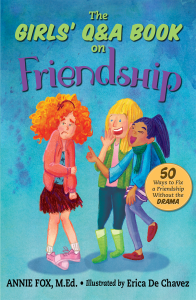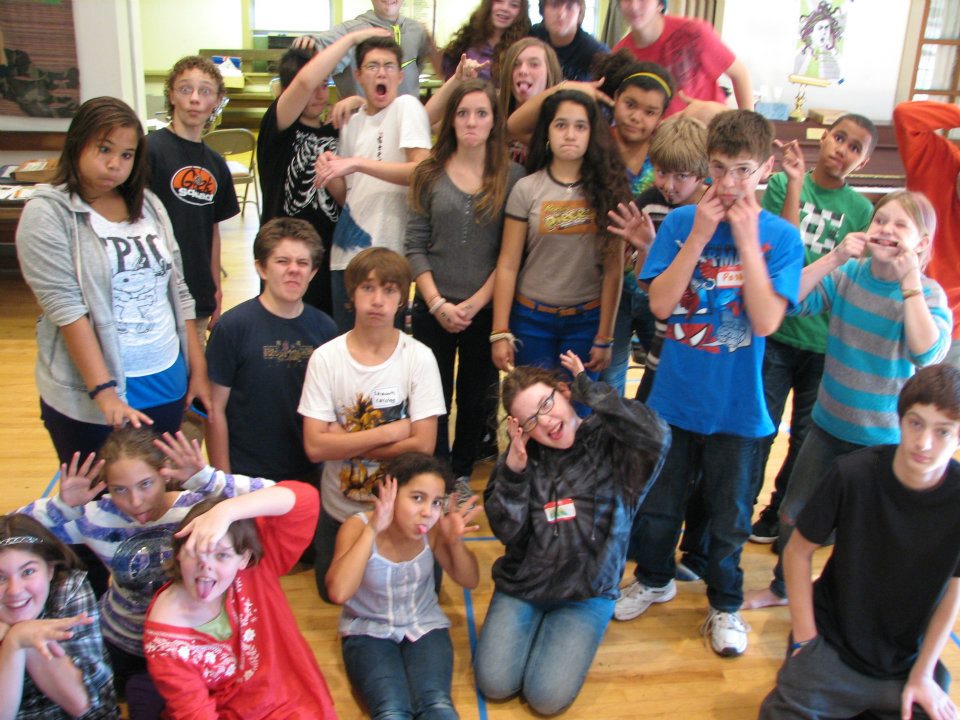This is Part 2 of a 5-part series based on students’ questions I received while visiting a school in St. Louis in early March. Missed the 1st part (Friendship issues from the 2nd grade)? Here it is. And please check back next week for Questions from the 4th grade.
What should I do if someone is being mean to me and not to anybody else? Not everyone knows when they’re being ‘mean.’ Sometimes people feel so angry or jealous they do and say things without thinking about other people’s feelings. That’s why it’s important for you to speak up whenever you are being treated disrespectfully. Even if you’re not the only one who’s being treated this way, you should still speak up. Show that you have respect for yourself. If his/her behavior toward you doesn’t change for the better, talk to your teacher. With the teacher’s help, you and this other person may be able to make the peace.
My bff twin bosses me. She wants to make me believe in something I know isn’t real. It’s very annoying. What should I do? Sometimes people who have an active imagination just automatically try to get other people to see things their way in a game or on the playground. Your bff may not be trying to “boss” you around. She may just be trying to get you to play a game in a certain way. If you’re not having fun always doing things her way, then you should tell her. And if that doesn’t change anything, it might be a good idea to spend time with friends who you feel more comfortable with.
One of my friends (A) called my other friend (B) “smart” and not me. Friend A had a playdate with Friend B (and not me) and the next day Friend A only talked about Friend B’s pet. It made me sad. What should I do? It can hurt if you feel like a friend you were once very close to is starting to like other people more than she likes you. That’s what the emotion jealousy is about. You may feel like you are in competition and that only one person can win. But that’s not necessarily the truth. I suggest you talk to Friend A and let her know how you’ve been feeling. Maybe she doesn’t even know! When we let our friends know how we feel, we can often work things out. And when we open our hearts, we can include more people in our friendship circle.
What if nobody want to play with me? I’m sorry you’re feeling like this. That tells me some kids in your class may not have been as friendly as they could be. I’m also thinking that there are probably some kids in your class who don’t realize that you are looking for friends. You should definitely talk to your teacher about this. Maybe he or she can give you some ideas for making new friends. Also, if your teacher knows that you are feeling lonely at school, s/he can do something about it by talking with the whole class about what it means to be a real friend and to make everyone feel welcome. I hope this helps.
Why does my friend get her way, usually? If the same person in a friendship seems to get her way most of the time, it may be because the other person has allowed that to happen. For example, if I always say, “Let’s go on the swings” and you always agree (even if you’re bored with the swings) then I’ll think you love the swings as much as I do. But that’s not the truth! Suppose you’d much rather climb on the climbing structure. If you never say what you want, how am I supposed to know? The next time your friend has a suggestion that you don’t agree with, you might say something like this, “I don’t feel like doing that today. How about if we do your idea tomorrow and my idea today?” That’s called compromise… and it is a good way to keep a friendship healthy and strong.
What do I do if two people go against one of my friends? I’m not exactly sure what you mean when you say “go against one of my friends” but it doesn’t sound too friendly. And it sounds like you feel you ought to do something to help your friend. Whenever you get that feeling that “something isn’t fair here,” pay attention to it. You have the power to stand up for anyone who is being treated unfairly. I hope you do that! That’s part of what it means to be a real friend. Also, it will make you feel proud of yourself for doing the right thing.
What do I do when someone is playing a game and doesn’t include me? Sometimes a game is set and it doesn’t work to let more people into it. (Like 9 people on a baseball team. That’s all that can play at one time.) If that’s the game then the people who don’t want to include you are not trying to be hurtful. But sometimes people who want to leave you out may be trying to hurt your feelings. If it feels like someone (or a group of people) are always trying to exclude you, then you have some choices: a) you can talk with them about it b) you can talk with a teacher about it c) you can look for other people to play with or d) you can feel sorry for yourself and waste a lot of your play time being in a bad mood (I would not recommend choice ‘d’). But you are not powerless. So think about what you’re trying to do and get some help, if you need it.
What should I do if my two friends say that I said something but I did not and I said I did not. It can be really frustrating when you are telling the truth and people do not believe you! I’m not really sure what you can ‘do’. No one has control over what other people say or think or believe. You can continue to tell them “I did not say that.” but there is no guarantee that they will believe you. Real friends tell each other the truth and real friends listen to each other. When they make a mistake, they apologize. Real friends treat each other with respect. It sounds like these friends are not being respectful to you. If they continue in this way, it is going to be hard for you to relax and feel comfortable around them. I don’t know why they refuse to believe you, but if it continues, I suggest you take a break from this friendship and if they ask “Why?” tell them “I need a friend who will believe me when I tell them the truth.”
Nobody wants to sit with me at lunch, not even my best friend. What should I do? Everyone deserves to have a friend to sit with at lunch! If your best friend doesn’t want to sit with, I’m wondering what makes this person your “best friend”? This doesn’t sound like “best friend” behavior. It also sounds like you don’t know why your friend is treating you this way. I think you should ask him/her “Why don’t you want to sit with me?” See if you can get to the bottom of this, on your own or with help from an adult.
What should I do when my friend does not treat me nice when I treat them nice? A friendship is a two-way street. Niceness and respect and all the other good things in friendship have to flow in both directions. When only one person is being nice and the other person isn’t, well, that friendship is in trouble! The best thing you can do is to be a real friend to yourself. What do I mean by that? I mean, talk to this friend and let him/her know that you don’t like the way s/he has been treating you. (Give an example of some of the ‘not nice’ behavior you are talking about). You might also say, “When you act this way, it feels like you aren’t my friend. So what’s going on?” Then close your mouth and LISTEN to what your friend has to say. Talking about friendship problems doesn’t always fix things, but it’s a very good place to start!
What should I do if somebody is pushing me around? The next time it happens you should hold up your hand, look the person straight in the eye and say, “Stop! Don’t do that.” If they don’t stop, talk to your teacher. It’s the responsibility of the school to make sure that every student is treated with respect. If this pushing around stuff continues, tell your parents and ask them for help. It’s your parents’ responsibility to make sure that you are safe. They can’t do their job if they don’t know what’s going on. Talk to them. They can help.















